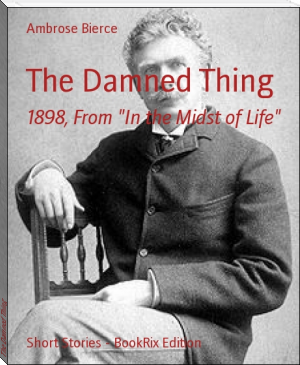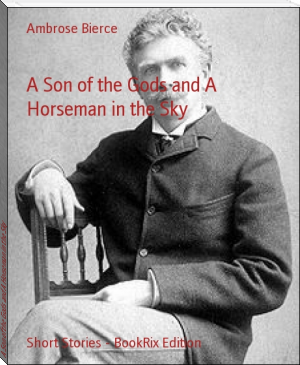Can Such Things Be? by Ambrose Bierce (popular books of all time .TXT) 📖

- Author: Ambrose Bierce
Book online «Can Such Things Be? by Ambrose Bierce (popular books of all time .TXT) 📖». Author Ambrose Bierce
But nothing of this did Mr. King say. With his better light he was trying to penetrate the mystery of the man's death. That he had not once moved from the corner where he had been stationed; that his posture was that of neither attack nor defense; that he had dropped his weapon; that he had obviously perished of sheer horror of something that he saw--these were circumstances which Mr. King's disturbed intelligence could not rightly comprehend.
Groping in intellectual darkness for a clew to his maze of doubt, his gaze, directed mechanically downward in the way of one who ponders momentous matters, fell upon something which, there, in the light of day and in the presence of living companions, affected him with terror. In the dust of years that lay thick upon the floor--leading from the door by which they had entered, straight across the room to within a yard of Manton's crouching corpse--were three parallel lines of footprints--light but definite impressions of bare feet, the outer ones those of small children, the inner a woman's. From the point at which they ended they did not return; they pointed all one way. Brewer, who had observed them at the same moment, was leaning forward in an attitude of rapt attention, horribly pale.
"Look at that!" he cried, pointing with both hands at the nearest print of the woman's right foot, where she had apparently stopped and stood. "The middle toe is missing--it was Gertrude!"
Gertrude was the late Mrs. Manton, sister to Mr. Brewer.
JOHN MORTONSON'S FUNERAL {1}
John Mortonson was dead: his lines in "the tragedy 'Man'" had all been spoken and he had left the stage.
The body rested in a fine mahogany coffin fitted with a plate of glass. All arrangements for the funeral had been so well attended to that had the deceased known he would doubtless have approved. The face, as it showed under the glass, was not disagreeable to look upon: it bore a faint smile, and as the death had been painless, had not been distorted beyond the repairing power of the undertaker. At two o'clock of the afternoon the friends were to assemble to pay their last tribute of respect to one who had no further need of friends and respect. The surviving members of the family came severally every few minutes to the casket and wept above the placid features beneath the glass. This did them no good; it did no good to John Mortonson; but in the presence of death reason and philosophy are silent.
As the hour of two approached the friends began to arrive and after offering such consolation to the stricken relatives as the proprieties of the occasion required, solemnly seated themselves about the room with an augmented consciousness of their importance in the scheme funereal. Then the minister came, and in that overshadowing presence the lesser lights went into eclipse. His entrance was followed by that of the widow, whose lamentations filled the room. She approached the casket and after leaning her face against the cold glass for a moment was gently led to a seat near her daughter. Mournfully and low the man of God began his eulogy of the dead, and his doleful voice, mingled with the sobbing which it was its purpose to stimulate and sustain, rose and fell, seemed to come and go, like the sound of a sullen sea. The gloomy day grew darker as he spoke; a curtain of cloud underspread the sky and a few drops of rain fell audibly. It seemed as if all nature were weeping for John Mortonson.
When the minister had finished his eulogy with prayer a hymn was sung and the pall-bearers took their places beside the bier. As the last notes of the hymn died away the widow ran to the coffin, cast herself upon it and sobbed hysterically. Gradually, however, she yielded to dissuasion, becoming more composed; and as the minister was in the act of leading her away her eyes sought the face of the dead beneath the glass. She threw up her arms and with a shriek fell backward insensible.
The mourners sprang forward to the coffin, the friends followed, and as the clock on the mantel solemnly struck three all were staring down upon the face of John Mortonson, deceased.
They turned away, sick and faint. One man, trying in his terror to escape the awful sight, stumbled against the coffin so heavily as to knock away one of its frail supports. The coffin fell to the floor, the glass was shattered to bits by the concussion.
From the opening crawled John Mortonson's cat, which lazily leapt to the floor, sat up, tranquilly wiped its crimson muzzle with a forepaw, then walked with dignity from the room.
THE REALM OF THE UNREAL
For a part of the distance between Auburn and Newcastle the road-- first on one side of a creek and then on the other--occupies the whole bottom of the ravine, being partly cut out of the steep hillside, and partly built up with bowlders removed from the creek- bed by the miners. The hills are wooded, the course of the ravine is sinuous. In a dark night careful driving is required in order not to go off into the water. The night that I have in memory was dark, the creek a torrent, swollen by a recent storm. I had driven up from Newcastle and was within about a mile of Auburn in the darkest and narrowest part of the ravine, looking intently ahead of my horse for the roadway. Suddenly I saw a man almost under the animal's nose, and reined in with a jerk that came near setting the creature upon its haunches.
"I beg your pardon," I said; "I did not see you, sir."
"You could hardly be expected to see me," the man replied, civilly, approaching the side of the vehicle; "and the noise of the creek prevented my hearing you."
I at once recognized the voice, although five years had passed since I had heard it. I was not particularly well pleased to hear it now.
"You are Dr. Dorrimore, I think," said I.
"Yes; and you are my good friend Mr. Manrich. I am more than glad to see you--the excess," he added, with a light laugh, "being due to the fact that I am going your way, and naturally expect an invitation to ride with you."
"Which I extend with all my heart."
That was not altogether true.
Dr. Dorrimore thanked me as he seated himself beside me, and I drove cautiously forward, as before. Doubtless it is fancy, but it seems to me now that the remaining distance was made in a chill fog; that I was uncomfortably cold; that the way was longer than ever before, and the town, when we reached it, cheerless, forbidding, and desolate. It must have been early in the evening, yet I do not recollect a light in any of the houses nor a living thing in the streets. Dorrimore explained at some length how he happened to be there, and where he had been during the years that had elapsed since I had seen him. I recall the fact of the narrative, but none of the facts narrated. He had been in foreign countries and had returned--this is all that my memory retains, and this I already knew. As to myself I cannot remember that I spoke a word, though doubtless I did. Of one thing I am distinctly conscious: the man's presence at my side was strangely distasteful and disquieting--so much so that when I at last pulled up under the lights of the Putnam House I experienced a sense of having escaped some spiritual peril of a nature peculiarly forbidding. This sense of relief was somewhat modified by the discovery that Dr. Dorrimore was living at the same hotel.
II
In partial explanation of my feelings regarding Dr. Dorrimore I will relate briefly the circumstances under which I had met him some years before. One evening a half-dozen men of whom I was one were sitting in the library of the Bohemian Club in San Francisco. The conversation had turned to the subject of sleight-of-hand and the feats of the prestidigitateurs, one of whom was then exhibiting at a local theatre.
"These fellows are pretenders in a double sense," said one of the party; "they can do nothing which it is worth one's while to be made a dupe by. The humblest wayside juggler in India could mystify them to the verge of lunacy."
"For example, how?" asked another, lighting a cigar.
"For example, by all their common and familiar performances--throwing large objects into the air which never come down; causing plants to sprout, grow visibly and blossom, in bare ground chosen by spectators; putting a man into a wicker basket, piercing him through and through with a sword while he shrieks and bleeds, and then--the basket being opened nothing is there; tossing the free end of a silken ladder into the air, mounting it and disappearing."
"Nonsense!" I said, rather uncivilly, I fear. "You surely do not believe such things?"
"Certainly not: I have seen them too often."
"But I do," said a journalist of considerable local fame as a picturesque reporter. "I have so frequently related them that nothing but observation could shake my conviction. Why, gentlemen, I have my own word for it."
Nobody laughed--all were looking at something behind me. Turning in my seat I saw a man in evening dress who had just entered the room. He was exceedingly dark, almost swarthy, with a thin face, black- bearded to the lips, an abundance of coarse black hair in some disorder, a high nose and eyes that glittered with as soulless an expression as those of a cobra. One of the group rose and introduced him as Dr. Dorrimore, of Calcutta. As each of us was presented in turn he acknowledged the fact with a profound bow in the Oriental manner, but with nothing of Oriental gravity. His smile impressed me as cynical and a trifle contemptuous. His whole demeanor I can describe only as disagreeably engaging.
His presence led the conversation into other channels. He said little--I do not recall anything of what he did say. I thought his voice singularly rich and melodious, but it affected me in the same way as his eyes and smile. In a few minutes I rose to go. He also rose and put on his overcoat.
"Mr. Manrich," he said, "I am going your way."
"The devil you are!" I thought. "How do you know which way I am going?" Then I said, "I shall be pleased to have your company."
We left the building together. No cabs were in sight, the street cars had gone to bed, there was a full moon and the cool night air was delightful; we walked up the California street hill. I took that direction thinking he would naturally wish to take another, toward one of the hotels.





Comments (0)